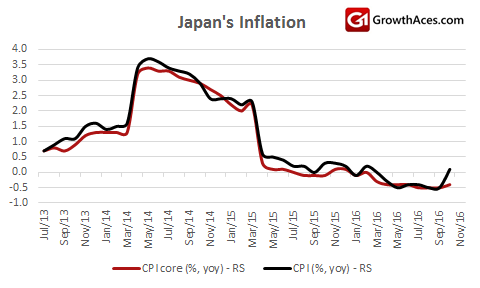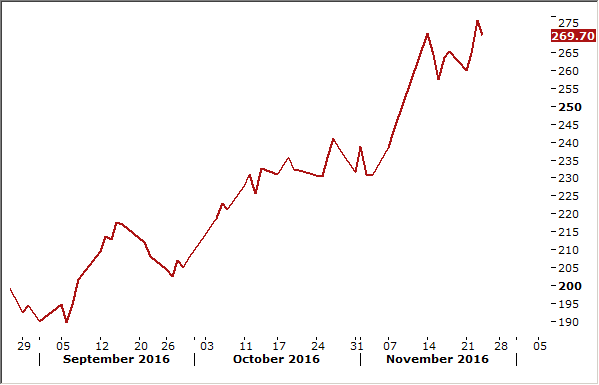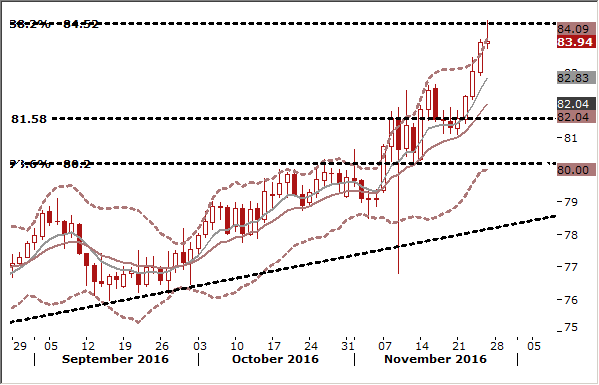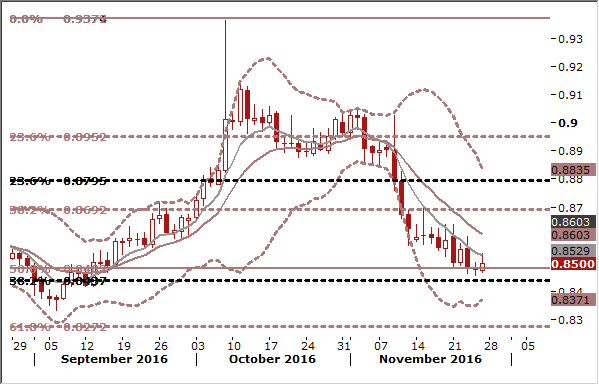Investing.com’s stocks of the week
- Japan’s nationwide core consumer price index, which includes oil products but excludes volatile fresh food costs, fell 0.4% in October from a year earlier after a 0.5% drop in September, matching a median market forecast. While falling gasoline and electricity prices continued to drag down inflation, nearly 60% of items making up the index saw prices rise, the data showed.
- With downward pressure from energy price declines easing and the yen's recent falls seen pushing up import costs, however, we can expect consumer prices to rebound early next year.
- A separate index compiled by the BOJ, which strips out the effect of energy and fresh food costs, showed inflation hit 0.3% in October, slightly up from a three-year low of 0.2% marked in September.

- The BOJ has acknowledged that it will take time for inflation to accelerate to its target, modifying its policy framework in September to one better suited to a protracted battle against deflation. It kept policy steady at a subsequent meeting in October despite pushing back the timeframe for hitting its price target.
- The AUD jumped on the JPY today as investors piled positions in high-yielding currencies with Aussie bond yields near 11-month highs. The AUD rises are driven by higher commodities prices.
- Let’s take a look at widening yield spread between 10-year Australian bond and 10-year Japanese bond.

- We took profit on our AUD/JPY short-term position and are looking to buy this pair again on dips. Our long-term strategy remains bullish with the target at 86.00.

EUR/GBP: Focus Is Turning Towards Political Risks In Eurozone
- The UK Chancellor, Philip Hammond, delivered a prudent Autumn Statement setting out the government’s tax and spending plans for the next five years. The statement was read as more growth-supportive and upbeat than some investors had expected.
- British Office for Budget Responsibility, the official fiscal watchdog, made forecast revisions that increased borrowing by GBP 84.3 billion over the next five years. This was due to higher than expected borrowing so far this year and a worse economic outlook following the Brexit vote. The OBR revised down its forecasts for GDP growth over the next five years. It now expects growth of 1.4% next year (previously 2.2%).
- The revision is the result of uncertainty surrounding the Brexit negotiations leading firms to delay investment and households to ease consumption in the face of higher imported inflation. The OBR also revised down potential growth, making a judgement that
-
any likely Brexit outcome would lead to lower trade flows, lower investment and lower net inward migration than we would otherwise have seen.
- Over the next five years, the cumulative downward revision to its GDP growth forecast is 1.4pp. Inflation is forecast to peak at 2.6% in 2018.
- Taken together, the tax and spending measures announced by the UK Chancellor Philip Hammond were a cumulative net fiscal easing of 0.4% of GDP over the next five years, which is fairly small. By far the largest spending increase was on a new National Productivity Investment Fund for house building, transport, telecoms, R&D and long-term investment. Welfare spending will be higher as the controversial cuts to disability benefits were dropped and the tapering of universal credit will be less aggressive. The rise in net spending is only partially offset by a net rise in tax.
- Notable measures here were another rise in insurance premium tax, a further crackdown on tax avoidance, and a reduction in salary sacrifice advantages. This more than offset tax cuts, including a freeze in fuel duty aimed at easing the expected rise in the cost of living next year from the rise in imported inflation.
- The consequence of the weaker backdrop and the modest fiscal stimulus is that the government is projected to borrow significantly more in each and every year of the forecast. Public sector net borrowing in 2016/17 has been revised up GBP 12.7 billion to GBP 68.2 billion (3.5% of GDP), and borrowing in 2020/21 has been revised up GBP 31.8 billion to GBP 20.7 billion (0.9% of GDP). Public sector net debt is expected to peak at 90.2% of GDP in 2017/18.
- As widely expected, the government has dropped its “fiscal mandate” of targeting a budget surplus in 2019/20. It has replaced this with an aim to balance the budget “as early as possible” in the next Parliament (i.e. beyond 2020). The OBR judges that the Chancellor’s new fiscal mandate leaves him with GBP 26.5 billion of fiscal room should the economic outlook deteriorate further.
- British Office for National Statistics said business investment expanded at a quarterly rate of 0.9% in the three months to September, beating market expectations for a 0.6% rise.
- The Office confirmed that Britain's economy grew 0.5% in the third quarter, helped by a rebound in exports and robust household spending. Britain's households increased their spending by 0.7% in the third quarter, slowing slightly but still helping to drive the economy in the face of uncertainty around Brexit. Net trade added 0.7 percentage points to economic growth, the biggest positive contribution since early 2014 and helped by strong growth in exports after the pound's post-referendum plunge.
- A survey by the Confederation of British Industry showed that British retail sales grew at their fastest rate in more than a year earlier in November. The CBI distributive trades survey's retail sales balance rose to +26 in November from October's reading of +21, its highest since September 2015. The CBI's expected sales balance for December also rose, while a broader quarterly measure of retailers' business situation was its healthiest since February. British shoppers have shown little sign of retrenching spending since June's vote to leave the European Union, despite a sharp fall in sterling that looks set to push up prices early next year.
- The GBP has been boosted against the EUR recently as investors have unwound heavy positions against the GBP, with the focus turning away from political risks facing Britain towards risks elsewhere, particularly in Eurozone. The EUR is weighed down by uncertainty over an Italian constitutional referendum in just over a week's time, and over French and German elections next year. We are looking to get EUR/GBP short on recovery attempts. Our sell order is currently at 0.8575.

